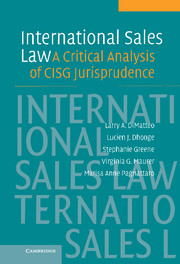Book contents
- Frontmatter
- Contents
- Preface
- Acknowledgments
- 1 INTRODUCTION
- 2 CISG METHODOLOGY AND JURISPRUDENCE
- 3 FORMATION: WRITING REQUIREMENTS
- 4 FORMATION: OFFER AND ACCEPTANCE RULES
- 5 OBLIGATIONS OF BUYERS
- 6 OBLIGATIONS OF SELLERS
- 7 COMMON OBLIGATIONS OF BUYERS AND SELLERS
- 8 BREACH OF CONTRACT BY SELLER
- 9 BREACH OF CONTRACT BY BUYER
- 10 DAMAGES, EXCUSE, AND PRESERVATION
- 11 SUMMARY AND OBSERVATIONS
- TABLE OF AUTHORITIES AND CASES
- APPENDIX A: UNITED NATIONS CONVENTION ON CONTRACTS FOR THE INTERNATIONAL SALE OF GOODS (CISG) (APRIL 11, 1980)
- APPENDIX B: CISG: TABLE OF CONTRACTING STATES (AS OF FEBRUARY 8, 2005)
- Index
9 - BREACH OF CONTRACT BY BUYER
Published online by Cambridge University Press: 06 August 2009
- Frontmatter
- Contents
- Preface
- Acknowledgments
- 1 INTRODUCTION
- 2 CISG METHODOLOGY AND JURISPRUDENCE
- 3 FORMATION: WRITING REQUIREMENTS
- 4 FORMATION: OFFER AND ACCEPTANCE RULES
- 5 OBLIGATIONS OF BUYERS
- 6 OBLIGATIONS OF SELLERS
- 7 COMMON OBLIGATIONS OF BUYERS AND SELLERS
- 8 BREACH OF CONTRACT BY SELLER
- 9 BREACH OF CONTRACT BY BUYER
- 10 DAMAGES, EXCUSE, AND PRESERVATION
- 11 SUMMARY AND OBSERVATIONS
- TABLE OF AUTHORITIES AND CASES
- APPENDIX A: UNITED NATIONS CONVENTION ON CONTRACTS FOR THE INTERNATIONAL SALE OF GOODS (CISG) (APRIL 11, 1980)
- APPENDIX B: CISG: TABLE OF CONTRACTING STATES (AS OF FEBRUARY 8, 2005)
- Index
Summary
The CISG provides for numerous procedures and remedies in the event of late performance by the seller or default by the buyer. These procedures and remedies are set forth in Articles 47, 48 and 61 through 65. The initial procedure established by these articles relates to late performance by the seller. In such circumstances, the buyer may set an additional period of time of “reasonable length” for the seller's performance. The buyer may not resort to any remedy for breach of contract during this period of time unless the buyer receives notice from the seller that it will not perform the contract regardless of any such extension. However, the buyer may claim damages resulting from the seller's delay in performance. In addition, the seller may, after the date of delivery, remedy, at its own expense, its failure to perform. Despite this provision, the seller must be able to remedy its failure without “unreasonable delay and without causing the buyer unreasonable inconvenience or uncertainty of reimbursement of expenses advanced by it.” The seller may request the buyer to make known whether it will accept such performance, and the buyer is required to respond to this request within a reasonable time. Such request is in fact assumed to be contained in any notice by the seller that it will perform within a specified time. If the buyer does not respond, the seller may perform the contract within the time set forth in the request.
- Type
- Chapter
- Information
- International Sales LawA Critical Analysis of CISG Jurisprudence, pp. 140 - 150Publisher: Cambridge University PressPrint publication year: 2005

